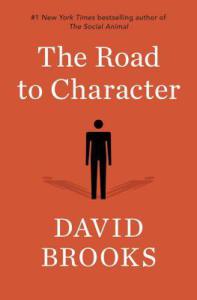
The Road to Character, David Brooks. New York, Random House, 2015.
Summary: David Brooks explores the issue of character development through the hard-won pursuit of moral virtue, exemplified in the moral quests of people as diverse as Augustine and Bayard Rustin, Frances Perkins and Dorothy Day.
I’ve long followed The New York Times op-ed pieces of David Brooks. Brooks often has seemed to me to be a quiet, reasoned voice speaking against the prevailing cultural winds. I wrote recently about the qualities of charity and cogency in public conversation and have long considered Brooks an exemplar of such qualities.
In The Road to Character, David Brooks seeks to initiate a conversation about moral ecology, particularly that of the United States. Brooks contends that there are two moral ecologies, one that emphasizes “resume” virtues, the other that emphasizes “eulogy” virtues, and that the resume virtue (or Adam I) moral ecology is prevalent in our moral landscape. It is a moral ecology that emphasizes “the Big Me” and focuses on skill and human potential. The other ecology (Adam II) understands human beings as “crooked timber” (a phrase drawn from Kant), and recognizes that we often fail to live up to our own ideals, and are not always fully aware of the drives and impulses that shape our moral actions, for good and for harm. This tradition emphasizes a moral awareness that results in humility, a striving toward moral excellence while acknowledge the reality that we fall short of the mark.
Brooks explores the “road to character” through brief sketches of a variety of individuals who he believe exemplify this “Adam II” quest. He explores the lives of a diverse cast of people from Frances Perkins, Roosevelt’s Labor Secretary, to the contrasting figures of A. Philip Randolph and Bayard Rustin (the former one of iron moral discipline, the latter who struggled toward a moral life and commitment for much of his life). There are both the religious, such as Augustine, who recognized that our incorrigible fallenness could only be overcome by grace, and those who turned from religion, like George Eliot, and who strove in their own character for moral coherence. We have the outwardly sunny Dwight Eisenhower, who struggled with a volcanic temper, and the self-controlled George Marshall, whose sense of calling and greatness of vision meant often working in supporting roles and yet gave Europe the Marshall Plan, which he always spoke of as the European Recovery Plan.
The concluding chapter is a kind of summing up, contrasting the “Big Me” of our current moral ecology, with the “code of humility” of the crooked timber tradition. His statements in this section were for me worth the price of admission. One example:
We are all ultimately saved by grace. The struggle against weakness often has a U shape. You are living your life and then you get knocked off course–either by an overwhelming love, or by failure, illness, loss of employment, or twist of fate. The shape is advance-retreat-advance. In retreat, you admit your need and surrender your crown. You open up space that others might fill. And grace floods in. It may come in the form of love from friends and family, in the assistance of an unexpected stranger, or from God. But the message is the same. You are accepted. . . . (265).
It seems this is an especially important conversation in this age of “Trumpery” where glitz and appearance seem to count for more than character. What I appreciate in what Brooks does is he engages us in a public conversation that includes both people of faith and those who would not identify with any faith but care about the moral character of our lives and public life. His exemplars are drawn from all of these backgrounds, and all are those who have had moral struggles and some reached moral conclusions that not all would embrace (for example George Eliot, who co-habited in a relationship with a married man).
It seems to me that Brooks is serious about this conversation. Not only has he appeared in various public and online media as well as his regular op-eds, but also he has created a companion website (The Road to Character) to the book. For my readerly friends, it includes a library of resources. He speaks in his book, borrowing a phrase from Eugene Peterson, of “the long obedience in the same direction.” It is my hope that Brooks will persist in this work, and find many companions on the journey.
Editor’s Note: Thank-you to Bob Trube for sharing his review of The Road to Character. For starting one’s academic year with other ESN Blog posts which touch on, even directly reflect upon virtue (or particular virtues), click here. As always, if you have a book recommendation and/or desire to write a review, then please contact ESN 🙂 ~ Thomas B. Grosh IV, Associate Director, Emerging Scholars Network
Bob Trube is Associate Director of Faculty Ministry and Director of the Emerging Scholars Network. He blogs on books regularly at bobonbooks.com. He resides in Columbus, Ohio, with Marilyn and enjoys reading, gardening, choral singing, and plein air painting.

Leave a Reply